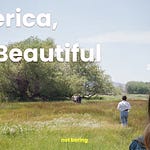Welcome to Episode 010 of Hyperlegible, a Not Boring Radio production.
To find all of the excellent essays we’ve discussed on Hyperlegible, head to Readwise.
Crossing the Cringe Minefield with Cate Hall is live: YouTube | Spotify | Apple Podcasts
Cate Hall is the CEO of Astera, one of my favorite multi-billion dollar private foundations, and one hell of a writer.
If you've noticed the word "agency" popping up all over the place recently, you have Cate to thank. Her 2024 essay, How to be More Agentic took the internet by storm and brought agency into the zeitgeist, where it has remained and grown. Now, she's even writing the Book on Agency, which you can sign up to pre-order here.
On the first episode of Hyperlegible with Tina He, when I asked who people should read more of, Tina recommended Cate.
So I was excited to see Cate drop a new essay that felt like it was written at me (and I think will feel like it was written at you, too) called Crossing the Cringe Minefield:
Like Tina said, Cate is really good at directly saying: this is how this works, and this is how to deal with it. She does that in the essay, and we expand on it in the conversation.
When we want to improve ourselves or our station in life, she argues, we start with the things that come naturally, the easy wins. They don't work. Then, we try things we don't love but don't hate. Those don't work, either.
Finally, we're faced with a choice: give up, or do the thing that feels deeply, incredibly uncomfortable, the thing that makes us cringe. That's where the answer normally is, because the cringe is a sign that we've left that area of ourselves under-developed.
“This means," Cate writes, "that existential cringe is actually a signal pointing you to where you can make the most progress quickly."
We all have something we want to get better at. We all have something that makes us cringe to even think about. And unfortunately for all of us, those two are intimately related.
While people have always felt irrational fear and shied away from doing uncomfortable things, letting cringe dictate our lives is a modern luxury. It’s part of the mechanism behind good times creating weak men. To avoid something because it feels a little scary is something that only a comfortable society can afford.
In her excellent book, Antimemetics: Why Some Ideas Resist Spreading, Nadia Asparouhova writes, “‘Cringe,’ a term that originated in tandem with the rise of social media, is a uniquely modern concept that refers to doing something that you misjudged as socially acceptable, which then evokes embarrassment from others.”
The cringe Cate writes about is an evolved version, an anticipatory cringe, almost drunkenly believing that a thing that won’t actually be cringe to others will be, preventing you from actually doing the thing. In either form, it’s a dangerous emotion.
Societally, Nadia writes, “Before cringe, people just....tried things, some of which landed, and some which did not.” Personally, Cate points out cringe has the same effect: preventing you from trying things and even discovering which will land and which won’t, and learning that even the ones that don’t land don’t hurt as much as you expect.
So, we must kill the cringe. For ourselves, and for society.
At one point, I mentioned that essays like How to be More Agentic and Crossing the Cringe Minefield seemed far afield from her day job running Astera, but she disagreed. Astera is a large, multi-billion dollar private foundation that works on creating technology and science for the public benefit through investing and grant-making. Part of the job is finding talented scientists and convincing them that they can do more than they realize.
“Paul Graham talks about the most important thing you can do is massively raise somebody's ambition,” Cate said, explaining that the Astera residency is, “Kind of like ‘Come here and we will help you think through how to be more effective in the world and how to find the best expression of this thing that you are really passionate about and the way that you want to see the world change.’ And I think that that is also what I'm trying to do with my writing.”
Cate’s writing, then, is a gift that I’m thrilled to share with the Not Boring community, because if all of us become more effective in the world, find the best expression of the thing we’re really passionate about and the way you want to see the world change, a lot of good things will happen.
We talk about how to do that and more, often in the form of a quasi-personal coaching session that I think applies to many of us.
If you're like me and have been avoiding something that makes you cringe, this conversation might be the kick in the ass you need. Or at the very least, it'll help you understand why you've been stuck in the same patterns. Either way, Cate is worth the listen (and the subscribe).
Links to a transcript, YouTube, Spotify, and Apple Podcasts are right down below so you can listen early and often.
Timestamps
[3:37] Cate summarizes "Crossing the Cringe Minefield"
[5:48] Why this essay resonates universally (and why your 30s aren’t too late)
[7:20] My personal cringe around asking for help
[8:15] Why cringe exists - the "hot stove" analogy for psychological patterns
[10:53] How cringe distorts your sense of proportion in normal situations
[12:19] What percentage of people actually overcome their cringe (less than 1%)
[13:40] Whether naming your fear publicly makes it easier to face
[15:54] How to identify your cringe using the Enneagram system
[22:06] Why personal vulnerability in writing creates audience connection
[23:23] How Astera's mission connects to Cate's writing on agency
[25:57] Whether Cate kicked off the "agency trend" before it was cool
[27:38] Coaching session: applying agency principles to Enneagram 7s
[32:49] The "gift of desperation" - how addiction led Cate to higher agency
[34:29] What it feels like to be high agency - seeing constraints as arbitrary
[35:39] The challenge of figuring out what you want once you can do anything
[37:05] Facing cringe is more agony than thrill initially
Final takeaway: [40:31] "The places where you feel existential cringe are where you can make the most progress as a person really quickly"
Thank you to our partners for supporting Not Boring:
Ramp: the official Business Card of Not Boring.
Rox: AI agents to help your best sellers sell better.
Vanta: easy compliance for startups who want to grow their revenue.
Readwise: the best software for smart, curious readers.
Many Ways to Hyperlegible
If you’re the reading type, I used Claude to turn the messy YouTube transcript into something well-formatted and clean:
TRANSCRIPT: Crossing the Cringe Minefield with Cate Hall (Hyperlegible 010)
As always, you can find the full conversation wherever you like by subscribing to Not Boring Radio:
YouTube:
Spotify:
Apple Podcasts:
While you’re there, give us a like, comment, and subscribe so we can bring great essays to more people.
You can also find links to all of the essays and conversations at readwise.io/hyperlegible. Thanks to our friends and sponsors at Readwise, you can head there for a free trial and get all Hyperlegible articles automatically added to your account.
A recent episode that’s gotten a lot of good feedback is my conversation with Reggie James on his essay, A tale of two Vaticans (or, OpenAI building an unholy spirit), in which we discuss some of the things that have taken up more of my thinking since writing The Return of Magic.
If you want more to read, here are two of Cate’s reading recommendations, two of her own on agency and one on dreams. Save them to Readwise and come back to them:
Cate’s favorite essay she’s written:
Sign up to learn when Cate’s book on Agency is available for pre-order
One essay Cate thinks more people should read:
Dream Mashups by Malcolm Ocean
Big thanks to Cate for joining me, and to Jim Portela for editing!
Thanks for listening,
Packy








